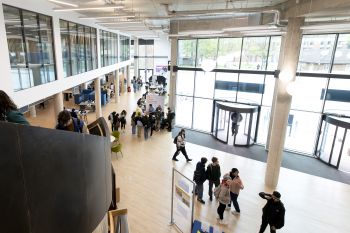An update from the Vice-Chancellor
Posted on behalf of: Internal Communications
Last updated: Friday, 13 May 2022

Our new Student Centre
David Maguire, Interim Vice-Chancellor sent a message to all colleagues today (3 May). You can read the message below:
Dear colleague,
I hope you enjoyed the bank holiday weekend.
I would like to start this week’s update by drawing your attention to the great news that a company that collaborated with our Sussex Drug Discovery Centre on research has been acquired by Pfizer.
ReViral worked with our scientists to design and synthesise a drug to treat respiratory synctial virus (RSV), which can be deadly for premature babies. The deal with Pfizer will benefit the University financially as a shareholder in ReViral.
Successes such as these send a clear message to the business sector that we have accessible and highly valuable academic expertise. Of course, we also have excellent resources to support our home-grown ideas and commercial ventures through the Sussex Innovation Centre. This is something that we want to continue to develop.
How our research translates into real-world applications and commercial viability is just one aspect of success. As the long-awaited Research Excellence Framework (REF) results will show next week, academic research is valued in many more ways for its impact beyond academia – especially in bringing about cultural benefits, governmental policy changes, improvements in health and society, and enhancing quality of life.
While there will always be debate over the effectiveness of these measurements in assessing academic worth, the REF results will have a significant impact on us in terms of reputation and funding. I will be writing more about this when the results are available. For now, I want to let you know that we will receive the first results on 9 May, but will not be able to share them with our community until 12 May, when the embargo is lifted. We have a detailed communications plan to ensure that you will be fully informed about our performance.
Sussex has an impressive record in many areas of research, including environmental sustainability. This year the University has done remarkably well again for delivering on the United Nations’ Sustainable Development Goals. We have risen to joint 37th (from 41st last year) in Times Higher Education World Impact Rankings out of more than 1,400 institutions, with a score of 93.1 out of 100. We are a very impressive 3rd in the world in the category Partnership for the Goals, which measures international partnership and global sustainability activity. Congratulations and thanks to everyone whose work has contributed to this outstanding outcome.
If we’re not there already, we are at least well on the way to being able to describe ourselves as one of the most sustainable universities in the world. Last week we held our Big Biodiversity Conversation, which included an opportunity for people to vote on suggested projects to further improve out biodiversity on campus. They ranged from turning the moats in Falmer House into rain-fed water gardens, to installing webcams in birds’ nests that would be visible on information screens around campus. The event also included talks by our own and visiting biodiversity specialists.
The more we encourage people to feel involved in our University’s environment and development, the more it becomes appreciated and cherished. Evidence of this is our new Student Centre. Judging by the numbers of students and staff making the most of its social areas and study spaces - and being the venue for a careers’ fair and our annual Product Design Show - within the first week of its opening, it has already become integral to our community life.
There was more good news from the Government this week that Ukrainian students in higher education in the UK will be able to access student loan funding and without needing to prove three years of residency. This, along with £4m funding for universities to support Ukrainians students in hardship, and appeals such as our own, will, hopefully, go some way to helping those who have lost so much since the Russian invasion began. I’m also pleased to report that UEG has also agreed to increase its support for the Council for Academics at Risk (Cara) from £5,000 to £15,000 a year.
I hope you have a good week.
Warm regards,
David Maguire
Interim Vice-Chancellor

